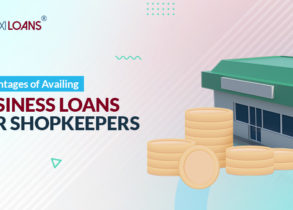Jan 05, 2023
Feb 16, 2026

Are you searching for the best way to finance your business? If so, a working capital loan could be the perfect solution. Whether you are interested in a traditional bank loan or a more modern online business loan, understanding the different types of working capital loans can help ensure that you make an informed decision. This article will explore the types of working capital loans and aspects of business loan eligibility for taking out a business loan online.
What is a Working Capital Loan?
Working capital refers to the funds used to conduct the day-to-day operations of a business. Without a free flow of working capital, a business would find it difficult to run effectively. Therefore, choose a working capital loan to guarantee the smooth operation of the business.
Top 5 types of Working Capital Loans
Broadly, 5 types of working capital loans are beneficial for your extensive or small business loan. Let’s discuss them in detail.
1. Short-Term Loans
The short-term loan has a fixed interest rate and payment period. However, you can obtain this for a business loan without any collateral, depending on the reliability of your credit history and relationship with the lender. It is also helpful for your small business loan, which allows entrepreneurs to invest in the everyday costs of running their businesses.
Pros
- With short-term loans, you often get the money very quickly after you apply for a business loan.
- Small cash loans are a good option in cases of insufficient daily cash flow. It prevents businesses from shutting down and maintains them from sinking during the low season.
- Short-term lenders may be willing to lend to you even if your credit history is bad.
- Compared to long-term loan amounts, short-term loan amounts are less. Hence, it is simple to repay the business loan EMI. Using a business loan EMI calculator, you can check your monthly installments.
- In case of equipment repairs, or technical breakdowns, short-term loans are available to cover emergency expenses.
Cons
- As the business loan amount is less, a higher interest rate is charged.
- A missed or failed attempt to repay a debt might lower your credit score.
- Early repayment penalty. You have to clear it immediately before the loan’s due date.
2. Credit line or Bank Overdraft Facility
You can take money from your savings or current account using an overdraft facility, even if there is no money in the account. Most financial institutions, including banks in the private and public sectors, offer this feature. According to terms and conditions set by the bank, lenders shall charge the interest rates that the borrower requires to repay.
Pros
- The account manager will offer you cash, whether it’s an urgent payment or a simple error.
- If your bank account funds are low, the recipient will not know.
- It does not require collateral.
- Even if your bank account does not have enough to cover the transaction, you are covered in the case of an emergency.
Cons
- Your transaction might only be processed if the other linked accounts have enough funds.
- It’s not always a good idea to use overdraft protection just because you have it. You still need to keep track of your finances, set spending goals, and understand your limits.
- A bank may terminate your membership if you misuse the overdraft protection service, especially if your account balance is negative for an extended period.
3. Trade Credit
It is an agreement between two businesses that allows one business to purchase products and services from another, with payment made later. It’s a great way for companies to extend their purchasing power and free up working capital.
Pros
- It offers products or services being imported or exported, enabling multinational businesses to overcome these obstacles more efficiently.
- Trade credit is reliable and convenient funding and is readily available to businesses.
- If the seller knows their creditworthiness, trade credit can easily be available to customers.
- If an organization wants to boost its inventory level to meet the expected rise in sales volume shortly, it can do so by using trade credit.
- No charge is made against the company’s assets when funding is provided.
Cons
- Merchants do not get instant payment for their goods. Offering credit terms to buyers disrupts the flow of funds for sellers because they have costs of their own to cover.
- Trade credit makes it simple for businesses to obtain credit, which could lead them to engage in excessive trading, increasing their risks.
- Trade credit can only generate a certain amount of money. Thus, it is not very helpful if a business requires a lot of money.
4. Account Receivables
You can always apply for business loan using your confirmed sales orders or accounts receivable. However, these loans are only secured if your business has a solid reputation and a track record of paying on-time debt payments. It is ideal, particularly if your company lacks the funds to complete a sales order.
Pros
- Unlike term finance, accounts receivable financing allows business owners to decide on the timing and amount.
- It is an unsecured business financing choice that avoids the need for assets or guarantors as collateral.
- Through this financing, you don’t have to relinquish a part of your business ownership to acquire finances.
- Factoring companies can often advance an invoice within 24 hours of submission.
- Funding for accounts receivable can immediately free up some working capital so you can use it to expand your company.
Cons
- Fee structures for financing accounts receivable can be complex and expensive.
- It might have higher interest rates than those charged on other business loans.
- If you decide to factor your invoices, you will have no control over this important aspect of your customer’s interactions with your business.
5. Letter of Credit
The buyer can purchase a letter of credit from a lender. After the sender sends the agreement order, the lender will pay the seller for the order’s cost. The bank then collects the money from the buyer at the appointed time.
Pros
- Letter of credit helps trade partners in business with unknown parties so they can expand their business quickly.
- A letter of credit is very reliable and efficient.
- An exporter is safer with a letter of credit in case the importer declares bankruptcy.
- When there is a disagreement between the trading partners, the exporter can withdraw the funds and take the matter to court.
- The administration of a letter of credit is quick.
Cons
- A letter of credit is subject to complex regulations and can be misused to the applicant’s benefit.
- As banks charge fees for their services, a letter of credit increases business costs.
- The major downside of a letter of credit is that it must be used before it expires, which creates a time constraint.
Why Choose FlexiLoans?
Businesses have an abundance of options for financing their working capital needs. Short-term, long-term, and revolving lines of credit loans come with different interest rates and terms which help you apply for a business loan online. You should explore all available options and select the best business loan that fits your current situation.
With the help of FlexiLoan, you can have quick access to funds and flexible repayment options, making them an ideal solution to meet your business’s financial needs. With FlexiLoan, you can access money when needed and pay it back at your convenience. They also come with attractive interest rates and repayment terms. So, if you want to finance your business and manage working capital, FlexiLoans is the best choice.







